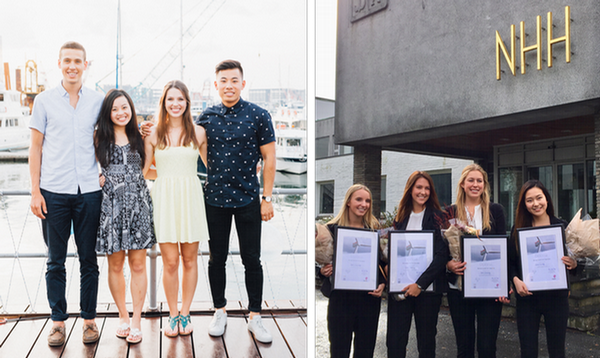Students show winning ways

As students, Walter Pang, BCom’14, and Jacob Trenholm, BCom’13 and Artsci'14, enjoyed the pressure and thrill of business case competitions. But they often encountered teams from abroad that were better prepared and won more competitions. Such teams tended to belong to organized programs that trained heavily. “We did some training too, but not nearly as much,” Jacob says.
To even the odds, Jacob, Walter and other students formed the Queen’s Case Competition Union in 2013. QCCU aimed to be something like a varsity squad. “Our idea was to train together a lot and practice cases to get better,” says Walter. With Walter and Jacob as co-captains, QCCU entered five competitions in its first academic year (2013-14) and scored three second-place finishes.
Results have improved each year since, but in the last academic year (2016-17) QCCU really hit its stride: seven Top 3 finishes (three of them first place) out of 10 entered competitions. Equally impressive: from May to October 2017, QCCU teams won four competitions in a row, in Thailand, Singapore, Norway and Hong Kong.
Strong finishes are the result of ongoing improvements to QCCU, say current co-captains Dustin Zhang and Charmaine Arellano-Chua (both Comm’18). A fall boot camp to help students prepare was introduced. More thought has also gone into assembling each four-person squad, ensuring students whose abilities complement one another are on the same team.
Students spend around 100 hours training per school year, says Charmaine. Preparations are designed to mimic the real-life of competition. “And we have an inflow of talent from new students who have new ideas, which helps us get better,” Dustin says. For this academic year QCCU added six Commerce students to its roster of 19, from 116 who applied to join.
The school is also lending a hand. Smith has upped funding for case competitions, while faculty and senior staff contribute their time. They lead workshops, coach teams, provide feedback at practice sessions and travel with teams as faculty advisors, says Leigh-Ann Fingland, Smith’s Director of Operations, Commerce Program, who works closely with QCCU members.
Walter and Jacob, meanwhile, are delighted to see the organization they helped found succeeding. Both work in Toronto — Walter with the CPP Investment Board and Jacob with Oliver Wyman — and say case competition experience is useful for later careers. “You learn to diagnose the component parts of a problem quickly and think it through objectively,” says Jacob. “That’s definitely a handy skill to have.”
